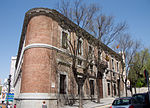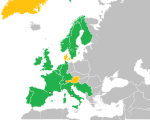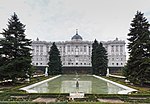Royal Monastery of La Encarnación
1616 establishments in SpainAugustinian nunneriesBien de Interés Cultural landmarks in MadridConvents of the Catholic Church in EuropeHerrerian architecture ... and 2 more
Monasteries in MadridOrganisations based in Spain with royal patronage

The Real Monasterio de la Encarnación (Royal Monastery of the Incarnation) is a convent of the order of Recollet Augustines located in Madrid, Spain. The institution mainly interned women from noble families, and was founded by the Queen Margaret of Austria, wife of Philip III, and thus was well endowed with wealth. Although it belongs to an enclosed religious order, the building is open to the public under the administration of the Patrimonio Nacional.
Excerpt from the Wikipedia article Royal Monastery of La Encarnación (License: CC BY-SA 3.0, Authors, Images).Royal Monastery of La Encarnación
Plaza de la Encarnación, Madrid
Geographical coordinates (GPS) Address Phone number External links Nearby Places Show on map
Geographical coordinates (GPS)
| Latitude | Longitude |
|---|---|
| N 40.419807 ° | E -3.711438 ° |
Address
Real Monasterio de la Encarnación (MonasterioEncarnacion)
Plaza de la Encarnación 1
28013 Madrid (Centro)
Community of Madrid, Spain
Open on Google Maps











